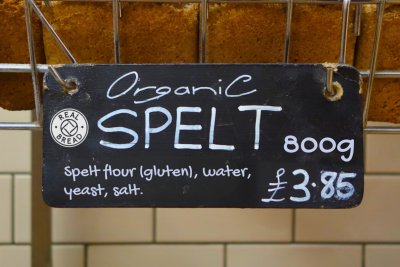Sustain / Real Bread Campaign / Articles
Let’s look at loaf labelling
From both sides of the bakery counter.

What must business owners do and not do? What information and protection does the law entitle shoppers to expect?
In the UK, what a food business is required to declare and how it must do so depends on whether the food is sold:
- Non-prepacked: sold loose, or packed after the customer has selected/ordered it
- Pre-packed for direct sale (PPDS): sealed in packaging and sold on the site where it was made (or at a site / outlet operated by the producer – such as a farmers’ market stall) before the customer selects/orders it.
- Pre-packed: sealed in packaging before the customer orders/selects it and sold by a third party.
Note to business owners
The following is abridged and adapted from the Real Bread Campaign’s Knead to Know…more business handbook. It is not legal advice. It is your responsibility to consult and follow relevant legislation and official guidance applicable in your country.
Pre-packed food
The producer must display the following mandatory information on the product packaging or on a label attached to the packaging:
- The name of the food.
- A quantitative ingredients declaration (QUID), if required.
- A list of ingredients, emphasising presence of any of the 14 main allergens.
- The net weight of the food.
- A best before or use by date.
- Your business name and address.
The way you do so must be in line with the food law requirements that apply in your nation.
Going above and beyond legal requirements, we urge all bakers / retailers to display this information voluntarily for all bread and industrial dough products: at the point of sale (eg shelf tickets or prominent signage) for non-prepacked food, and/or on labels applied to packaging of PPDS food. As part of our Honest Crust Act proposals, we continue lobbying the government to make this mandatory.
Food pre-packed for direct sale (PPDS)
Following years of campaigning by organisations including The Allergy Alliance, the Real Bread Campaign and, notably, the family of Natasha Ednan-Laperouse, since 2021 it has been mandatory for UK food businesses to label the following on product packaging, rather than choose to give it verbally:
- Name of the food (e.g. wholemeal bread).
- Full ingredients list.
- Allergen declaration.
- Quantitative ingredients declaration (QUID) on any product containing meat.
If you have used non-wholemeal wheat flour, you must declare the so-called fortificants that were added by the mill, for example: wheat flour [wheat flour, calcium carbonate, iron, niacin, thiamine, folic acid].
The way you do so must be in line with the food law requirements that apply in your nation. If you choose to declare more information than is legally required (as we propose above) you must follow the requirements for pre-packed food in full – you can’t pick and choose.
Distance selling
If you sell food online or by phone or mail order, customers must be able to get this information for free before they buy. You must provide the information on your website, in your catalogue, or set up a freephone number for people to call. Again, we encourage publication of this important in full – see above.
Non-prepacked
The food business is legally required to declare the:
- Name of the food (eg wholemeal bread).
- Full ingredients list.
- Presence of allergens.
- Quantitative ingredients declaration (QUID) for any product containing meat.
- Product weight, unless it’s 400g (which can be labelled as ‘small’) or 800g (which can be labelled as ‘large’). Products that weigh 300g or less are exempt from this requirement.
You are permitted to give this information verbally (in which case you must display a notice inviting customers to ask for it - and train your staff accordingly) though we urge all businesses voluntrarily to follow the labelling requirements for pre-packed food – see above.
Optional information
Having met mandatory labelling requirements, you might choose to provide additional information, such as:
- A one-line, explanatory description to supplement the product name with genuine and useful information.
- Your bakery logo – build that brand awareness!
- The Real Bread Loaf Mark (if you have signed up to the scheme)
- Logo of an assurance scheme that you are licensed / certified to use.
- Your website.
- Social media handles.
If you have space, you might also add a note along the lines of: “Store in a cool, dry place (such as a bread bin) or slice and freeze. Do not store in the fridge as this can speed staling and encourage mould growth.”
Legal (and honest) marketing
Knead to Know more also includes notes on the regulation of health and nutrition claims (e.g. it's not legal to advertise sourdough as ‘more digestible’ or ‘more nutritious’ as neither is on the GB register of permitted claims) and on commonly (mis)used terms including:
- organic
- wholemeal
- wheat germ
- yeast-free
- gluten-free / low gluten etc.
- Granary (which is a H*vis trademark)
Legistation and guidance
Key pieces of legislation on food labelling / information are The Food Information Regulations 2014 (FIC), which stem from Regulation (EU) No 1169/2011 on the provision of food information to consumers.
The government offers official guidance on:
For advice, contact your local authority. Responsibility usually lies with the trading standards department.
See also
Published Tuesday 25 March 2025
Real Bread Campaign: Finding and sharing ways to make bread better for us, our communities and planet.

